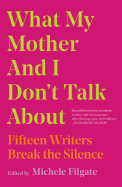
 Literary Hub contributing editor Michele Filgate thought she was writing an essay about her stepfather's abuse, but it turned out she was really writing about the relationship with her mother that allowed such abuse to continue. After years of work, her essay was eventually published by Longreads under the title "What My Mother and I Don't Talk About." Readers and writers responded strongly, and Filgate's piece now leads this astonishing anthology.
Literary Hub contributing editor Michele Filgate thought she was writing an essay about her stepfather's abuse, but it turned out she was really writing about the relationship with her mother that allowed such abuse to continue. After years of work, her essay was eventually published by Longreads under the title "What My Mother and I Don't Talk About." Readers and writers responded strongly, and Filgate's piece now leads this astonishing anthology.
What My Mother and I Don't Talk About: Fifteen Writers Break the Silence follows that essay with a breathtaking range of responses. Filgate writes, "Mothers are idealized as protectors: a person who is caring and giving and who builds a person up rather than knocking them down. But very few of us can say that our mothers check all of these boxes. In many ways, a mother is set up to fail." And while many of the essayists featured here reproach mothers who have hurt them, there are also apologies, confessions and unsolved mysteries. These essays bring many perspectives and deal in self-awareness, too.
In "Thesmophoria," Melissa Febos considers her close relationship with her psychotherapist mother by recalling myths, chiefly that of Persephone and Demeter. "We often love the things that abduct us." Brandon Taylor wrestles with the pain his mother has caused: "It's strange, really, that to grasp that which has hurt you, you must trust it not to hurt you when you let it inhabit you"--or when you write about it.
Alexander Chee hides the abuse he's suffered from his mother because of the tragedy they've endured together: "This is how we got each other through." Dylan Landis seeks to understand her mother better through an old apartment building, and a possible former lover. Amid the layered traumas of race, nation and gender, Kiese Laymon asks his mother: "Can we please get better at loving each other in America?" Carmen Maria Machado finds her own conflicted feelings about parenthood linked to her mother's harsh treatment. And André Aciman considers his deaf mother's language, separate from words, and what it taught him.
Leslie Jamison closes the anthology with an essay exploring her mother through the eyes of an outsider to the family unit: her mother's first husband's unpublished novel about their marriage. It is a fitting conclusion, with that surprise perspective and a careful, loving attention to the woman who came before the mother.
These collected essays are variously rich, tender, angry, despairing and clinical. The result, greater than the sum of parts, is part paean and part denunciation, intelligent, heartfelt and wise. What My Mother and I Don't Talk About is a shrewd, glinting collection of beauty and pain: a gift for mothers and their children. --Julia Kastner, librarian and blogger at pagesofjulia
Shelf Talker: Diverse writers answer the title's prompt with essays that are cutting, furious, delicate, generous and everything in between.

